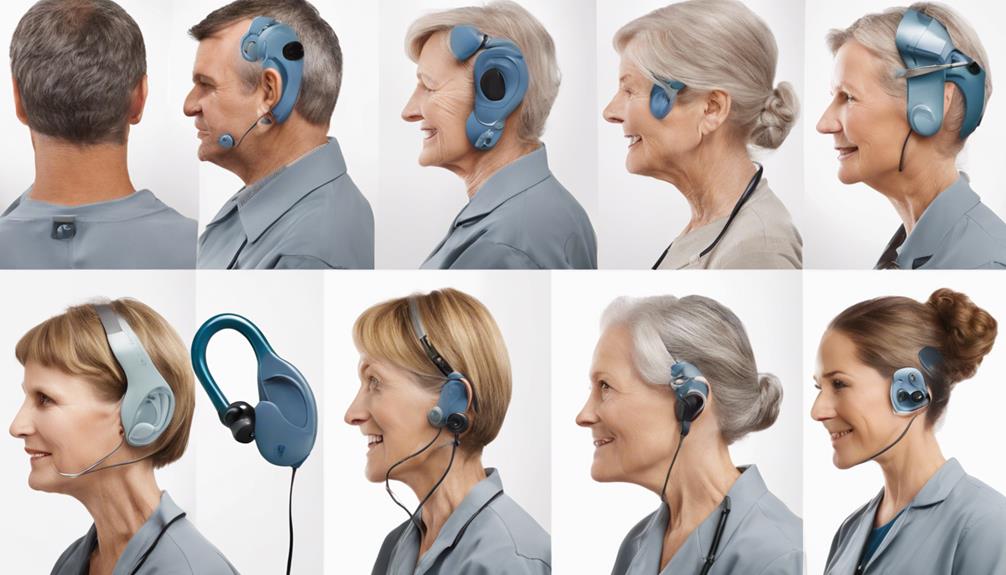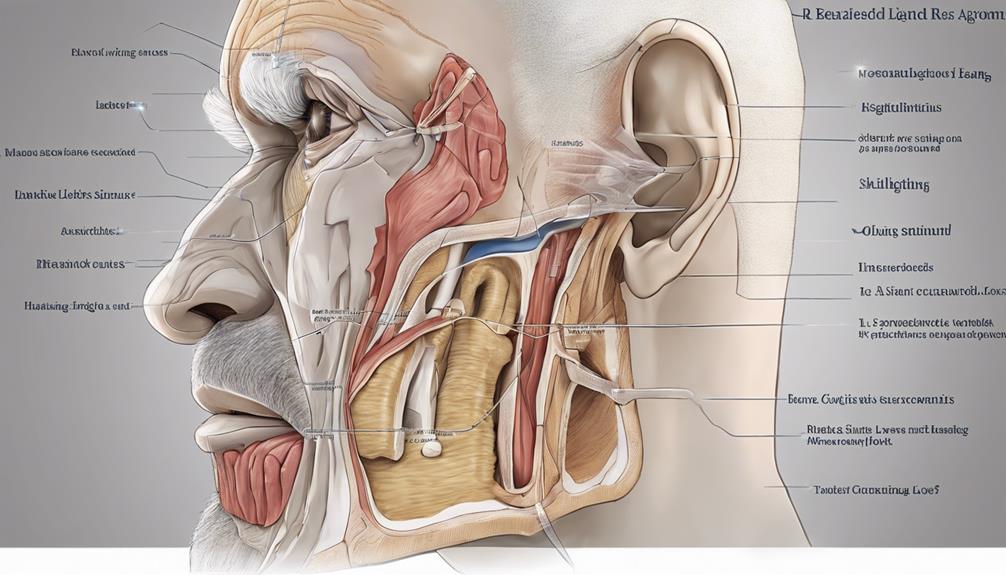Are you aware of the recent changes in Medicare coverage for cochlear implants? Understanding these policy updates can have a significant impact on individuals with hearing impairment.
By exploring the eligibility requirements, types of implants covered, and out-of-pocket expenses, you can navigate the Medicare criteria more effectively.
Stay tuned to uncover how these developments are reshaping access to cochlear implantation and improving the quality of life for many beneficiaries.
Key Takeaways
- Medicare covers cochlear implants for bilateral moderate-to-profound hearing loss.
- Eligibility requires limited benefit from hearing aids and willingness for post-implantation rehabilitation.
- Out-of-pocket costs are partially covered by Medicare and additional benefits may be available through Medigap or Advantage plans.
- Approval process involves meeting specific criteria, submitting comprehensive documentation, and staying informed on policy updates.
Eligibility Requirements for Medicare Coverage
To qualify for Medicare coverage for cochlear implants, individuals must meet specific eligibility requirements concerning their hearing impairment and previous interventions. The coverage criteria stipulate a diagnosis of bilateral moderate-to-profound sensorineural hearing impairment. Additionally, beneficiaries need to demonstrate limited benefit from appropriate hearing aids before considering a cochlear implant.
Medicare mandates that individuals possess the cognitive ability and willingness for rehabilitation post-implantation, ensuring optimal outcomes. It's crucial that beneficiaries are free from specific medical conditions that could potentially impact the effectiveness of the cochlear implant. Furthermore, compliance with FDA-approved labeling for the cochlear implant device is essential to meet Medicare coverage guidelines.
Types of Cochlear Implants Covered

Medicare covers both single-channel and multi-channel cochlear implants for eligible beneficiaries, catering to varying needs and preferences. Single-channel cochlear implants are often recommended for adults with limited word recognition, while multi-channel implants provide enhanced speech understanding capabilities. The decision between these two types of cochlear implants is based on individual needs and candidacy criteria.
Medicare assesses the severity of hearing impairment and the potential benefits each type of implant can offer to determine coverage eligibility. The criteria for both single-channel and multi-channel cochlear implants align with Medicare guidelines, ensuring that beneficiaries receive appropriate devices that meet their specific requirements.
Out-Of-Pocket Costs and Expenses
Our out-of-pocket costs for cochlear implants under Medicare Part B typically encompass 20% of the Medicare-approved device cost. It's important to note that Medicare Advantage plans may provide additional benefits for follow-up care, rehabilitation, and monitoring of cochlear implants. On the other hand, Medigap plans can offer coverage for most out-of-pocket costs related to cochlear implants, thereby providing valuable financial assistance. However, it's essential to be aware that some Medigap plans do not cover the Part B deductible for Medicare qualifiers post January 1, 2020, which can impact out-of-pocket expenses significantly. When considering Medicare Advantage plans, it's crucial to carefully assess the coverage they offer for cochlear implants to make an informed decision based on the benefits and costs involved.
| Aspect | Details |
|---|---|
| Medicare Part B Coverage | 20% of Medicare-approved device cost |
| Medicare Advantage Plans | Additional benefits for follow-up care |
| Medigap Plans | Coverage for most out-of-pocket costs |
| Part B Deductible | Not covered for some plans post Jan 1, 2020 |
| Evaluation | Assess benefits and costs for wise choices |
Medicare Criteria for Cochlear Implant Coverage

Discussing the criteria for Medicare coverage of cochlear implants entails evaluating specific requirements for eligibility based on hearing impairment severity and treatment outcomes. Medicare covers cochlear implantation for individuals diagnosed with bilateral moderate-to-profound sensorineural hearing loss. To qualify for coverage, candidates must demonstrate limited benefit from appropriate hearing aids. Additionally, individuals need to show cognitive ability and a willingness to undergo rehabilitation post-implantation.
However, specific medical conditions such as middle ear infections may disqualify individuals from receiving coverage. The updated criteria also include testing scores between >40% to ≤60% on sentence cognition. Medicare coverage for cochlear implants aims to ensure that beneficiaries meet the necessary criteria to benefit from this FDA-approved treatment option. Meeting these criteria is essential for individuals seeking assistance with severe hearing impairments under the Medicare program.
Process for Obtaining Medicare Approval
When seeking approval for cochlear implantation through Medicare, submitting a claim with comprehensive documentation is crucial. It is essential to ensure that the patient meets all Medicare coverage criteria for cochlear implantation to facilitate the approval process. By following the guidelines and requirements outlined by Medicare, one can increase the chances of obtaining approval for the procedure. Effective communication with healthcare providers and Medicare representatives can also help streamline the approval process. Staying informed about any updates or changes to Medicare coverage policies related to cochlear implants is important for a smooth approval process.
| Approval Process | Importance |
|---|---|
| Comprehensive Documentation | Crucial for approval |
| Meeting Coverage Criteria | Ensures eligibility |
| Communication | Facilitates the process |
| Policy Updates | Stay informed for efficiency |
Frequently Asked Questions
What Are the Medicare Guidelines for Cochlear Implants?
Sure!
When it comes to Medicare guidelines for cochlear implants, it's crucial to meet specific criteria like severe hearing loss and limited benefit from hearing aids. Qualifying entails having bilateral moderate-to-profound sensorineural hearing impairment and being willing to undergo rehabilitation. Compliance with FDA-approved labeling for the device is a must.
Conditions like middle ear infections could impact eligibility. Recent changes in 2022 require applicants to meet certain sentence cognition score thresholds for coverage.
Does Medicare Cover Cochlear Implants 2023?
Yes, Medicare covers cochlear implants in 2023 for individuals meeting specific criteria. Eligibility hinges on bilateral moderate-to-profound sensorineural hearing loss, limited benefit from hearing aids, cognitive ability for rehabilitation, and adherence to FDA-approved labeling.
The 2022 expansion now includes those with test scores >40% to ≤60%. However, non-covered cases exist for those not meeting all criteria, except in FDA-approved investigational device exemption trials.
Medicare's coverage is contingent on meeting diagnosis, cognitive, and compliance standards.
What Is the 60 60 Rule for Cochlear Implants?
The 60 60 rule for cochlear implants is a recent Medicare change that benefits individuals with test scores ranging from >40% to ≤60%.
This expansion, effective since September 26, 2022, allows Medicare beneficiaries with moderate-to-profound hearing impairment to qualify for cochlear implants.
When Did Medicare Start Covering Cochlear Implants?
Medicare started covering cochlear implants in April 2005. This coverage was established under a specific National Coverage Determination (NCD) that outlined selection guidelines and hearing test score requirements. Eligible individuals needed to participate in approved trials and adhere to FDA device usage guidelines.
The initial criteria included a diagnosis of bilateral moderate-to-profound sensorineural hearing loss. Over time, Medicare's coverage for cochlear implants has expanded with updated criteria and broader eligibility thresholds.
Conclusion
In conclusion, Medicare coverage for cochlear implants has expanded, providing improved access for beneficiaries with hearing loss. With eligibility criteria in place, individuals can now benefit from this life-changing technology without facing significant financial burdens.
Isn't it reassuring to know that Medicare is prioritizing the well-being and quality of life for those struggling with hearing impairment?











